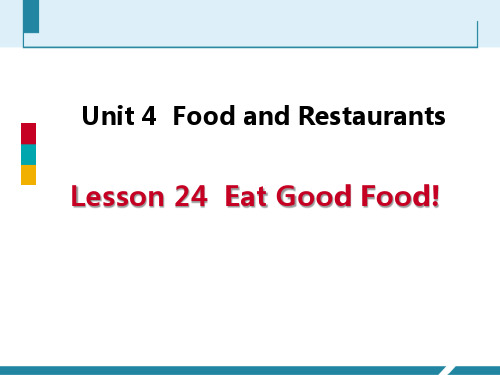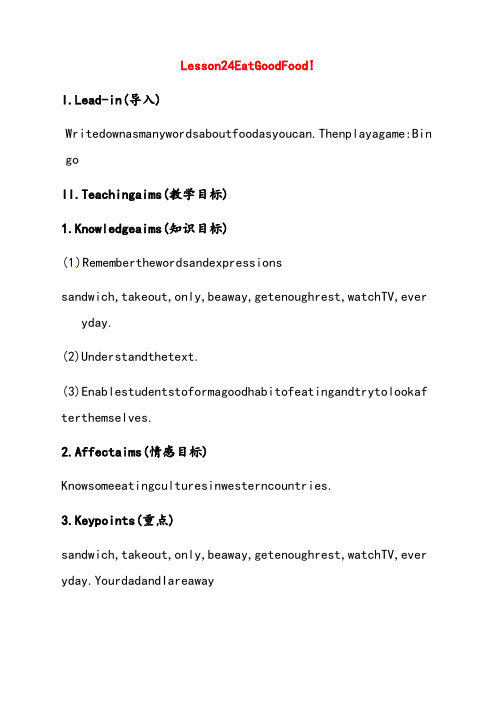冀教版-英语-七上-第24课 Eat Good Food
- 格式:doc
- 大小:24.00 KB
- 文档页数:1



Lesson24EatGoodFood!I.Lead-in(导入) Writedownasmanywordsaboutfoodasyoucan.Thenplayagame:Bin goII.Teachingaims(教学目标)1.Knowledgeaims(知识目标)(1)Rememberthewordsandexpressionssandwich,takeout,only,beaway,getenoughrest,watchTV,ever yday.(2)Understandthetext.(3)Enablestudentstoformagoodhabitofeatingandtrytolookaf terthemselves.2.Affectaims(情感目标) Knowsomeeatingculturesinwesterncountries.3.Keypoints(重点)sandwich,takeout,only,beaway,getenoughrest,watchTV,ever yday.YourdadandIareawayforthreedays.Eatgoodfoodandgetenou ghrest.Don’twatchtoo muchTV.4.Difficultpoints(难点)Thesentencepattern:YourdadandIareawayforthreedays.Don’twatchtoomuchTV.III.Guidetheautonomouslearning.(引导自主学习)1.Self-motivatedlearning(自学) LettheSsreadthenewwordsandthetextbythemselves.2.Cooperativelearning.(互学)(1)Workingroupstoexchangeanddiscussthemeaningofthetexta ndtranslatesomeexpressions.(2)Asksomeofthemtoshowtheirresults.(3)听课文,判断正误。



Unit 4 Food and RestaurantsLesson 24 Eat Good Food【教学目标】(1)能够听、说、读、写单词:sandwich, takeout, tip, only, P.S., away。
(2)掌握和运用所学句型谈论一日三餐,了解什么是健康的饮食,并能够提出关于饮食方面的建议。
(3)能够听、说、运用句型:1) Your dad and I are away for three days.2) Eat good food and get enough rest.3) Don’t watch too much TV.4) You can make a sandwich or you can order takeout.(4)能够用正确的语音、语调朗读课文中的对话, 能运用所学知识与他人问候交流,进行英语日常交际。
【教学重难点】重点:能够听、说、读、写单词:sandwich, takeout, tip, only, P.S., away。
难点:学会关于培养健康饮食习惯的句型。
句型:1) Your dad and I are away for three days.2) Eat good food and get enough rest.3) Don’t watch too much TV.4) You can make a sandwich or you can order takeout.【教学方法】情景导入法、活动探究法。
【教学过程】新课导入:Let’s Review!复习上一课所学过的单词。
fruits, vegetables, meat, bread, milk新课讲授:Step 1 New words and expression.(1) sandwich [’sænwidʒ] n. 三明治Sandwiches are my favourite food.(2) takeout [’teɪkaʊt] n. 外卖食品tip [tip] n. 指点,提示A takeout is a store or restaurant which sells hot cooked food that you eat somewhere else.He left a large tip after lunch. 午饭后留了一大笔小费。
英语-打印版
英语-打印版
课 题:Lesson24 Eat Good Food
【学习目标】 知识目标:
1 掌握单词:sandwich, takeout, tip , P.S. , away, only
2 掌握短语:be away, get enough rest, watch TV , every day , for three days,
on your bed, too much
3 掌握句型:① Your dad and I are away for three days. ②I put your new jacket
and your favourite shorts on your bed. ③Eat good food and get enough rest ④ Don’t watch too much TV. ⑤ Here are some tips for you.
能力目标:学会用英语向别人提出有关吃饭的建议。
情感目标:体验应用英语关心别人以及在日常生活中应用的乐趣。
【学习重点】掌握有关建议别人应该吃什么东西的词汇、短语和句型。
【学习难点】掌握有关建议别人应该吃什么东西的词汇、短语和句型。
了解祈使句。
【学法指导】 1. 自主学习,并通过熟读课文独立完成相应练习。
2. 课堂探究,针对
自主学习过程中的疑难点大胆质疑,教师点拨,学生独立完成导学案。
3. 自主归纳知识点,作好学情反馈。
【预习导学】
Ⅰ根据汉语提示完成句子
1. I can make (三明治)
2. Li Ming (离开)for five days .
3. Do you often (看电视) after supper?
4. Do we have (足够的) food in fridge ?
5. How many vegetables do you have (每天) ?
6. This room is (仅仅) for men. 【课堂导学 合作探究】
1. Your dad and I are away for three days. 我和你爸爸要离开(家)三天。
be away “不在;离开”一般用来表示“不在;离开”的状态。
for 后接表示一段时间的状语。
2.I put your new jacket and your favourite shorts on your bed. 我把你的新夹克和最喜欢的短裤放在你的床上了。
put sth.+介词短语(表示地点)“把某物放在某地”e.g. I put my books on the table.
3.Don’t watch too much TV!不要看太多电视! too much “太多” 修饰不可数名词;too many “太多”,修饰可数名词复数。
e.g. Do n’t eat too much meat.
There are too many eggs in the basket.
4. 祈使句 表示请求、命令、建议等句子,通常说话的对象是第二人称you, you 常被省略,动词原形位于句首。
否定的祈使句,在肯定句前加“Don’t”。
如:Don’t
watch too much TV. Have a glass of milk every day.
【当堂检测】 连词成句
1. much, don’t meat too, eat (.)
2. can , the, dumplings , I, fridge, find, in some (.)
3. vegetables, do , day, you, every (?)
4.boy, like, noodles, doesn’t , the (.)
5.mother , jacket, on , my, the, new, bed, puts, my (.)
Ⅱ. 完形填空
My name is Jack. I often 1 a lot of food , but I am very thin(瘦). I
am the only boy in my family. My 2 hope (希望) I am strong (强壮的). 3 often makes much good food for 4 . In the 5 , I have an 6 , some bread and a glass of 7 . At noon, I 8 home . I have 9 at school. I have some chicken and bread . At four o’clock in the afternnon, I 10 . Mum makes some dumplings . I hope I can be strong in the future(将来).
1. A. drink B. eat C. get
2. A.father B. mother C. parents
3. A. We B. They C. Mum
4. A. me B. I C. my
5.A. evening B. afternoon C. morning
6. A.banana B. egg C. apples
7. A. milk B. meat C. fish8, A. am not at B. don’t go C. go 9. A. breakfast B. supper C. lunch
10. A. go home B. go to school C. go to bed Ⅲ.任务型阅读
Mike , Jim and Kate are good friends. I know them and know what they like. Mike likes oranges very much. He doesn’t like apples. Jim like eggs very much. He doesn’t like tomatoes(番茄). What does Kate like? She likes strawberries. She doesn’t like bananas. Does she like oranges? Sorry, I don’t know. 阅读短文判断正(T)误(F)
( )1.Mike and Jim are brothers. ( ) 2. Jim likes bananas. ( ) 3. Mike doesn’t like oranges. ( ) 4.Kate likes strawberries. ( ) 5. Kate doesn ’t like oranges.。